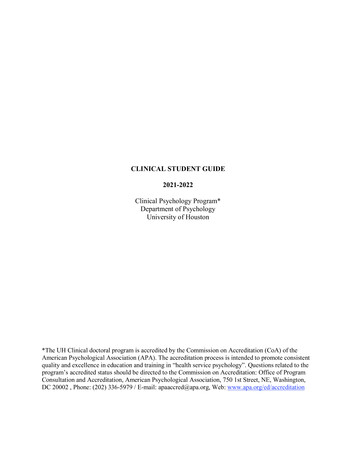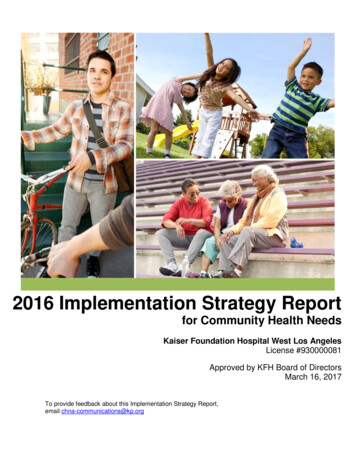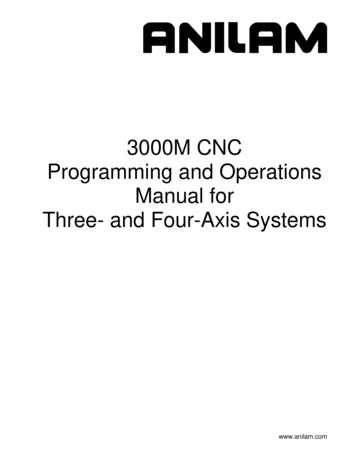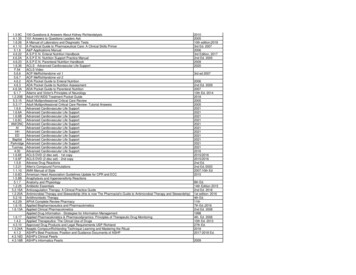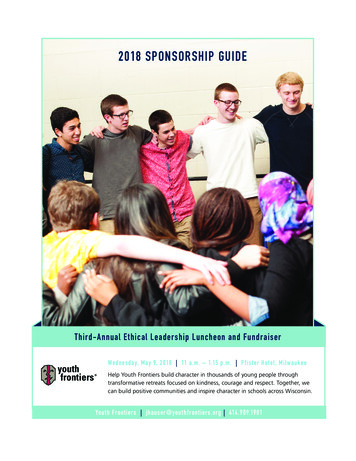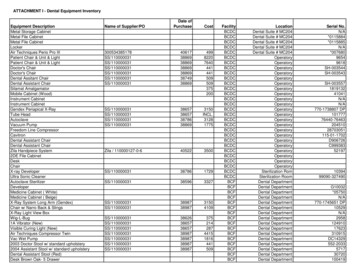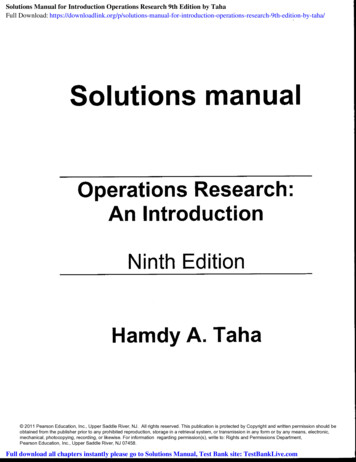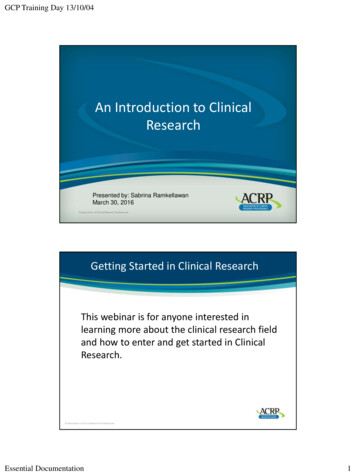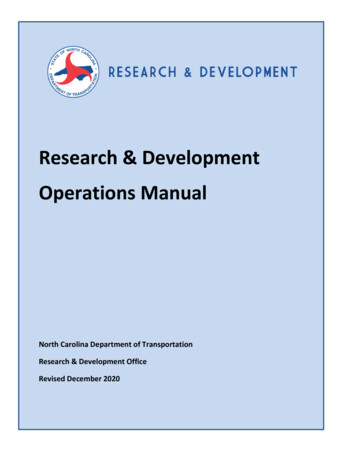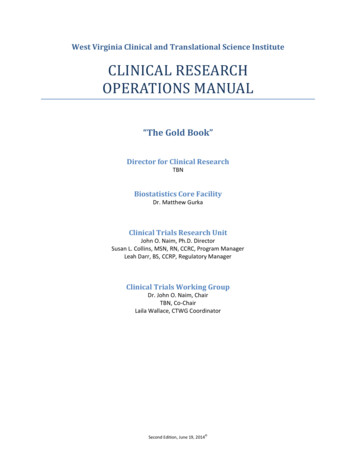
Transcription
West Virginia Clinical and Translational Science InstituteCLINICAL RESEARCHOPERATIONS MANUAL“The Gold Book”Director for Clinical ResearchTBNBiostatistics Core FacilityDr. Matthew GurkaClinical Trials Research UnitJohn O. Naim, Ph.D. DirectorSusan L. Collins, MSN, RN, CCRC, Program ManagerLeah Darr, BS, CCRP, Regulatory ManagerClinical Trials Working GroupDr. John O. Naim, ChairTBN, Co-ChairLaila Wallace, CTWG CoordinatorSecond Edition, June 19, 2014
Table of ContentsIntroduction and Background . iThe Gold Book. iiAbbreviations.iiiI.Clinical Trials Working Group (CTWG) . 1II.Protocol Review and Monitoring . 2A.Protocol Concepts/LOIs Review . 3B.Review of New Protocols . 3C.Guidelines for Initiation of an Amendment . 4III.Investigator Initiated Protocol Development . 4A.Protocol Development Guidelines . 4B.Available WVCTSI Resources to Assist In Protocol Development. 5C.Investigator Responsibilities . 8D.Human Subject Protection and GCP Training. 10E.Informed Consent . 11F.Data Safety and Monitoring Plan . 12G.Serious Adverse Event Reporting . 15H.Data Acquisition. 16I.Eligibility Verification . 16J.Budget Development . 18K.Trial Registration. 18L.Protocol Review and Activation . 19M. Funding Guidance . 23N.IV.Collaborating Institutions . 24Industry Sponsored Protocols . 26A.Confidentiality Disclosure Agreement . 26B.Feasibility Assessment . 26C.Budget Review and Cost Analysis . 27V.Core Descriptions and Processes . 27A.Bioinformatics and Biostatistics Core Facility . 27B.Biospecimen Processing Core . 27C.Clinical Trials Research Unit . 28D.Clinical Pharmacology Shared Resource Core Facility . 28E.Genomics Core Facility. 28Second Edition, June 19, 2014
F.Molecular Medicine Core Facility . 29G.Pathology and Histology Services . 29H.Electron Microscopy Core Facility . 30I.Center for Advanced Imaging . 30J.Flow Cytometry Core Facility . 31K.Tissue Bank and Research Laboratory . 31Appendices . 33Appendix 1 – Clinical Trials Working Group Members . 34Appendix 2 - Protocol Templates . 35Appendix 3 – Investigator Responsibilities . 37Appendix 4 – Data and Safety Monitoring Plan . 38Appendix 5 – Sample Budget and Worksheet . 44Appendix 6 – Billing Order Set . 47Appendix 7 – Study Coordinator Assessment Tool . 48Appendix 8 – CTRU Application . 50Appendix 9 – CTWG Reviewer Form. 52Appendix 10 – CTWG Pharmacy Review Form . 54Appendix 11 – CTWG BioStat Review Form. 55Appendix 12 – WVCTSI Research Services Directory . 56Second Edition, June 19, 2014
Introduction and BackgroundThe policies and procedures in the second edition of the West Virginia Clinical and Translational ScienceInstitute’s Clinical Trials Operations Manual (hereafter referred to as the Gold Book) were adapted fromthe Mary Babb Randolph Cancer Center Clinical Trials Operations Manual (referred to as the Blue Book).The West Virginia Clinical and Translational Science Institute wishes to both acknowledge and thank theMary Babb Randolph Cancer Center Clinical Trials Research Unit for their support and guidance as wecontinue to build our clinical research enterprise.There are elements in the second edition of the Clinical Trials Operations Manual that are in theformative phases of development as our research mission and programs continue to evolve. However,those policies and procedures that are not yet mature or implemented are designated To Be Establishedor To Be Developed and connoted by the abbreviation of TBE and TBD respectively, in areas of theoperations manual text herein. Additionally, several Clinical Trials Research Unit (CTRU) and scientificadministrative positions are To Be Named, which are connoted by TBN. Subsequent editions of the GoldBook will capture these new requirements as they come online.Second Edition, June 19, 2014 i
The Gold BookThe Gold Book provides a roadmap for the conduct of Good Clinical Practice (GCP) based clinical studies.It has been developed to provide transparency to the process of developing, executing and monitoringclinical and translational research projects uniformly throughout the State. Further it should help tofacilitate the integration of research operations across WVCTSI participating institutions by standardizingpolicies and procedures for the conduct of clinical trials and population studies.The clinical research operation manual (Gold Book) applies to all WVCTSI related clinical research notinvolving cancer patients. This manual applies to faculty participating in clinical research for allparticipating institutions conducted under the auspices within WVCTSI.Second Edition, June 19, 2014 ii
SMBDSMPFDAFDAAAGCPGold ISAESOCTBDTBETBNWVCTSISecond Edition, June 19, 2014 Adverse EventCollege of American PathologistsConfidentiality Disclosure AgreementsCollaborative IRB Training InitiativeClinical Laboratory Improvement AmendmentsConflict of InterestCase Report Form(s)Clinical Trials Research UnitClinical Trials Working GroupCurriculum VitaeData Monitoring CommitteeData Safety Monitoring BoardData and Safety Monitoring PlanFood and Drug AdministrationFood and Drug Administration Amendment Act of 2007Good Clinical PracticeWVCTSI Operations ManualHealth Insurance Portability and Accountability Act of 1996Health Sciences CenterInstitutional Animal Care and Use CommitteeInvestigational Device ExemptionInvestigator Initiated TrialInvestigational New DrugInstitutional Review BoardLetter of IntentNational Institutes of HealthNational Library of MedicineOffice of Human Research ProtectionOffice of Research Integrity and ComplianceOffice of Sponsored ProgramsPrincipal InvestigatorSerious Adverse EventStandard of CareTo Be DeterminedTo Be EstablishedTo Be NamedWest Virginia Clinical and Translational Science Instituteiii
I.Clinical Trials Working Group (CTWG)The WVCTSI Director, the Vice President of Research and Graduate Studies, and the WVCTSI AssistantDirector of Operations work closely with the Director of the CTRU. The CTWG Chairman is chargedwith establishing and maintaining CTRU research infrastructure, integration, and interfaces tosupport clinical trials and population research missions. The CTWG meets on a bimonthly basis and iscomposed of faculty and hospital leaders throughout the Health Sciences Center. The CTWG iscommitted to leading, building, and providing suitable resources for WVCTSI investigators to conducthighly interactive clinical trial and population research projects. In addition, the CTWG also facilitatesresearch collaborations across partner institutions. In the WVCTSI, each partner institution organizesand centralizes their participant-oriented research activities under the CTWG umbrella to increaseefficiency and provide a mechanism for regular and ongoing information about studies, investigators,and personnel. See Appendix 1 for a list of members.PurposeThe main function of the CTWG is protocol review and monitoring. The CTWG is responsible forscientific review of investigator-initiated protocols. More specifically, CTWG is established toaccomplish the following: To advise the WVU Institutional Review Board on the scientific merit of proposed protocols. To establish priority ranking for protocols. To ensure that each clinical trial or proposed study has an appropriate statistical section. To ensure that the data to be collected are appropriate to the study’s goals. To monitor the progress of WVCTSI protocols. To activate approved research protocols. To recommend protocol closure to the appropriate Department/School leadership.Criteria for Selection of CTWG MembershipThe Director of Clinical Research appoints members of the CTWG. Ad Hoc members are added asdictated by the protocol therapeutic area. Clinical Trials Working group includes a balance of seniorclinical investigators and new clinical investigators so as to foster the development of newresearchers. Additional reviewers are asked by the CTWG to comment on specific protocols and toassist in the review of protocols in their area of expertise, as needed.CTWG Expertise and ChargeThe CTWG has sufficient breadth of expertise to allow objective and critical scientific review of alltypes of therapeutic, non-therapeutic and investigator-initiated clinical trials. The Committeeincludes experts from each of the respective sub-specialties that include: pediatrics, internalmedicine, nursing, pharmacy, community medicine, behavioral sciences, laboratory correlativestudies, biostatistics and patient advocacy. At time of the review, a representative (preferably the PI)for the trial participates in the discussion, but is not involved in the review process itself. Often, trialsSecond Edition, June 19, 2014 1
are conditionally approved pending clarification of certain scientific elements. The CTWG is chargedwith review of the scientific rationale for the trial, establishing the priority relative to other clinicaltrials, and providing input and review regarding the objectives and rationale of the study, the studydesign including assessment of drug schedule, drug dose sequence plus escalation and de-escalation,and laboratory correlative studies, biostatistical input of endpoints and sample size, feasibility ofboth accrual and patient tolerance and completion of laboratory correlative studies.Protocol Routing and ActivationOnce the protocol has been reviewed and approved by the CTWG, the Clinical Trials Research Unit(CTRU) Regulatory Office is notified that the protocol is allowed to be submitted to the WVU IRB. Ifother approvals are required, such as those for cell and gene therapy protocols, the appropriateadditional committee is apprised such as the Biosafety Committee, Radiation Safety Committee, etc.Simultaneously, Clinical Trials Research Unit (CTRU) coordinates other necessary documents thatallow protocol activation. All protocols that involve patients placed on pharmacokinetic studies,research biopsies, etc., are reviewed and coordinated with the CTRU. Once each of the componentsof protocol approvals has been completed, this is reviewed by HSC administration and the protocol issigned off and activated by the Director for Clinical Research.Selection Criteria for CTWG Membership and InteractionsMembers of the CTWG are appointed by the Director for Clinical Research with consultation with theHSC Chancellor for a renewable 3-year term. Members are expected to participate in the semimonthly committee meeting and provide focused expertise as needed in protocol review. In rareinstances, the CTWG may invite an outside reviewer or convene an ad hoc committee to assist withthe review of a protocol or other matter that falls outside the committee’s expertise or to address ascientific issue that may entail a potential conflict.Guidelines for OperationThe CTWG meets semi-monthly. The meeting is chaired on a rotating basis by the Chair and coChairs; each is responsible for sign-off of final minutes for the appropriate session chaired. The CTWGChair is responsible for overall coordination of the meeting and responding to or directing anyinquiries. The assigned meeting Chair and co- Chair develop the meeting agenda, which is distributeda minimum of 3 days before each scheduled meeting. The Committee considers new concepts (LOIs)presented by individual investigators, reviews new protocols, and monitors the progress of activestudies.II.Protocol Review and MonitoringEmphasis of protocol review and monitoring is placed on review of investigator-initiated institutionaltrials and investigations. Of greatest importance is the assistance the Clinical Trials Working Groupprovides investigators in the development of concepts that lead to successful activation of novelclinical research protocols. Guidance is also provided to those studies, which are prevention andbehavioral intervention oriented. Investigators are encouraged to bring new therapeutics conceptsor letters of intent to the CTWG for review. By the time these trials are reviewed, bio-statistical inputhas been provided through the WVCTSI Clinical Research Design, Epidemiology & Biostatistics CoreSecond Edition, June 19, 2014 2
Facility faculty, and study coordinators have participated in the logistical operations development.The department Chair and/or Section Chief will have reviewed the concept or LOI for the availabilityof patients and for overlap in prioritization relative to other active clinical trials.A. Protocol Concepts/LOIs ReviewBefore development of a formal protocol, investigators are encouraged to present the objectives ofthe proposed trial in the form of a concept/letter of intent (LOI) for review by the CTWG. Theproposed trial will be discussed with the investigator present, from the following points of view: 1)scientific merit; 2) statistical methodology; 3) relationship to ongoing protocols; and 4) accrual goals.The potential funding source(s) for any particular concept/LOI is also identified (e.g., industrysponsor, etc.). Investigator-initiated clinical investigation is given highest priority by CTWG, since thisis the primary level of physician investigator-initiated clinical investigation and provides an importantvenue to mentor new and junior investigators. Priority is also given to WVCTSI clinician scientists,scholars and pilot awardees. No formal action is taken by the CTWG on concept presentations.Formal LOI submissions are, however, fully reviewed and acted upon by the Committee.B. Review of New ProtocolsA CTRU service application, reviewer, statistician and study coordinator sign-off sheets, are used tofacilitate the review process, see Appendix 8.Prior to the CTWG review, two members are designated by the Chair or co-Chair to review eachprotocol. The CTWG review includes a biostatistician and pharmacy reviewers (as applicable). Ingeneral, the reviewers will be representative of the discipline appropriate for the protocol underreview. The CTWG will make every effort to avoid assigning potential co-investigators as reviewers.The reviewers receive a complete protocol, informed consent document, and sign-off sheets 5 daysprior to the meeting.The Committee evaluates the scientific merit of proposed protocols, appropriateness of the targetpopulation, and appropriateness of patient care. The CTWG ensures that each clinical trial has anappropriate statistical section and a realistic accrual goal. The reviewing statistician is responsible forstatistical sign-off.For industry sponsored and multicenter nationally funded studies, the assigned study coordinator isresponsible for logistical review and presenting the study at a convened CTWG meeting. The CTWGhas the opportunity to ask questions and to assure that the study is feasible, CTRU resources areavailable and costs are covered by the sponsor. The PI is usually not required to attend this meeting,but is free to request attendance on a case by case basis. These studies are usually not subject toscientific review.See CTRU protocol submission and activation schema on page 19.Second Edition, June 19, 2014 3
Scientific Score and CTWG RecommendationsThe CTWG assigns a scientific score, range 1.0 to 5.0: 5-Outstanding, 4- Excellent, 3 - Good, 2 Acceptable, 1 - Not Scientifically Meritorious.In addition the protocol is given a probability of funding score: 5 – High, 3 -Medium, 1- Low.Overall score is the product of the two scores. An overall score of greater than 10 would beconsidered meritorious and score of 25 is the highest possible overall score.CTWG may take one of the following actions based upon the recommendation of the reviewers: theprotocol may be approved; approved pending clarification or incorporation of committeerecommendations; deferred for major revision or clarification; or not approved. Action is based onthe majority of members present at the meeting.The CTWG’s recommendations are provided to the Director for Clinical Research, and the WVU IRB.Written recommendations are given to the investigator(s). The CTWG will reviewdeferred/disapproved protocols after modification, and if found acceptable, the approval isforwarded to the IRB for consideration.C. Guidelines for Initiation of an AmendmentAll changes in an investigator-initiated protocol are submitted to the CTRU and the CTWG in the formof an amendment and signed by the principal investigator at the time of IRB submission. Most ofthese are administratively reviewed. However, any major changes in the treatment intervention,increased risk, or toxicity reporting are reviewed by the full committee. All amendments aresubmitted to the IRB after CTWG review.III. Investigator Initiated Protocol DevelopmentA. Protocol Development GuidelinesA clinical trial is designed to answer a specific question or set of related scientific questions.Having a clear hypothesis and related set of scientific questions is essential to design the clinicaltrial appropriately and ensure that the experimental plan is well suited to address the questions.1Two tips when formulating a research question and/or hypothesis:1. It is very important that it meets the following criteria: Feasible, Interesting, Novel,Ethical and Relevant (FINER)2. It should be as informative as possible so it should include the description of the:Population, Intervention, Comparison group, Outcome (PICO).1Guide to Clinical Research At USC: pages 50-58, October 2013Second Edition, June 19, 2014 4
Key Steps: Thoroughly review internal data (i.e., laboratory and/or clinical) and perform anextensive literature review to support the hypothesis and justify the conduct of theclinical trial protocol Define the primary and secondary objectives, general eligibility criteria and overallexperimental approach/treatment plan Seek statistical consultation to discuss study design (available through WVCTSI) Seek expert opinion on proposal Perform a feasibility assessment with assistance of CTRU Develop initial application for funding from industry sponsor (Letter of Intent) or grantApplication Develop Initial protocol draft1Protocols that are complete and descriptive facilitate the entire process of conducting clinicaltrials. Investigators should ensure that all essential protocol sections are completed. Animportant task for a coordinator is to read and re-read the protocol until it is completely clearand become as knowledgeable of every aspect of it as possible. It is a good idea to discuss allprotocol specifics and who will perform the tasks involved so that there is a clear delineation ofresponsibilities and logistics.The essential sections of the protocol are listed below. Note that not all studies will require all ofthese sections, so it is important to tailor your protocol to your individual needs andinstitutional/departmental requirements. Protocol templates are available from the WVCTSIand CTRU and are located in Appendix 2. Protocol Synopsis/summaryStudy aims/hypothesisBackground and rationale (literature review)Study designSelection of study population and patient eligibilityStudy drug/device descriptionTreatment planData managementData safety and management planB. Available WVCTSI Resources to Assist In Protocol DevelopmentIdea Formation and Development of Mentoring TeamsWVCTSI Support: (also see Appendix 12 for contacts) Hypothesis generation: Integrated Data Repository (IDR) Biomedical Informatics Resources: Lan Guo, lguo@hsc.wvu.edu 293-6455 Research Guidance and Mentoring Team Development Research Pathfinder: Chad Higgins, cchiggins@hsc.wvu.edu 581-1922Second Edition, June 19, 2014 5
Clinical Trials Working Group: Review of Concepts Clinical Trials Research Unit: John Naim, jnaim@hsc.wvu.edu 293-4944Research Concept Development Committee Research Pathfinder: Chad Higgins, cchiggins@hsc.wvu.edu 581-1922Study Planning and DesignWVCTSI Support: (also see Appendix 12 for contacts) Evaluation of Data Availability: Integrated Data Repository (IDR): Expert Consultation Development of Survey Instrument: RedCap Clinical Research Design, Epidemiology, and Biostatistics: Matt Gurka, mgurka@hsc.wvu.edu293-6760Research Concept Development Committee Biomedical Informatics Resources: Lan Guo, lguo@hsc.wvu.edu 293-6455Analysis of Study Design and Data Acquisition: Research huddles, Walk-in clinics Biomedical Informatics Resources: Lan Guo, lguo@hsc.wvu.edu 293-6455Research Pathfinder: Chad Higgins, cchiggins@hsc.wvu.edu 581-1922Clinical Trials: Assistance in planning and coordination Clinical Trials Research Unit: John Naim, jnaim@hsc.wvu.edu 293-4944Protocol DevelopmentWVCTSI Support: (also see Appendix 12 for contacts) Research Pathfinder Consultation Clinical Trials: Assistance with development of and review of Institutional ReviewBoard (IRB) protocols Clinical Trials Research Unit: John Naim, jnaim@hsc.wvu.edu 293-4944Community-Based Participatory Research and Community-Based Trials: Guidance onIRB submission Research Pathfinder: Chad Higgins, cchiggins@hsc.wvu.edu 581-1922Community Engagement and Outreach: Geri Dino, gdino@hsc.wvu.edu 293-1898Research Subject Advocacy Ethics, Regulatory Knowledge, and Support: Dan Vasgird, daniel.vasgird@mail.wvu.edu293-6094 Data Safety Monitoring and Informed Consent Process Ethics, Regulatory Knowledge, and Support: Dan Vasgird, daniel.vasgird@mail.wvu.edu293-6094Second Edition, June 19, 2014 6
WVU kc system training for submission of IRB protocols Ethics, Regulatory Knowledge, and Support: Dan Vasgird, daniel.vasgird@mail.wvu.edu293-6094IRB protocol entry into kc: including BRAAN Migration Administrative Core; Ethics, Regulatory Knowledge, and Support: Dan Vasgird,daniel.vasgird@mail.wvu.edu 293-6094Clinical Trials Research Unit: John Naim, jnaim@hsc.wvu.edu 293-4944Data Collection and AnalysesWVCTSI Support: (also see Appendix 12 for contacts) Clinical Trials: Registration, consenting of patients and data acquisition Community and Practice-Based Sites: Data collection Clinical Trials Research Unit: John Naim, jnaim@hsc.wvu.edu 293-4944Community Engagement and Outreach: Geri Dino, gdino@hsc.wvu.edu 293-1898Data extraction/collection: Integrated Data Repository (IDR) Biomedical Informatics Resources: Lan Guo, lguo@hsc.wvu.edu 293-6455Biostatistics: Data interpretation, Statistical Power Analysis, Other stats support Clinical Research Design, Epidemiology, and Biostatistics: Matt Gurka, mgurka@hsc.wvu.edu293-6760Research FundingWVCTSI Support: (also see Appendix 12 for contacts) Funding Opportunities Clinical and Translational Pilot Grants Program( 25,000-100,000 over a period of 18 months; varied RFA’s)WVCTSI Small Grants Program( 5,000 for one year, rolling submissions)Grant Development and Review: Pre- and post-award services WVCTSI Administrative Core: Mary Huntley, mjhuntley@hsc.wvu.edu293-0247Additional HSC Programs and Research Support:West Virginia Tissue Bank—James Coad, MD, Department of PathologyPathology and Histology Services – Kymberly Gyure, MDBiospecimen Processing Core—Acquiring and processing of biospecimens for use intranslational cancer research—William Petros, PharmDBioinformatics and Biostatistics Core Facility – Matthew Gurka, PhDSecond Edition, June 19, 2014 7
Clinical Pharmacology Shared Resource Center – William Petros, PharmDComputation and Structure Biology Core Facility – Peter Gannet, PhDFlow Cytometry Core Facility – Kathleen Brundage, PhDGenomics Core Facility –Stephen DiFazio, PhDLaboratory Animal Resources –Jeffery Wimsatt, DVM, PhDCenter for Advanced Imaging – Karyn WallaceMicroscopic Imaging Facility –Karen Martin, PhDAnimal Imaging Facility – Sarah McLaughlinTransgenic Animal Core Facility – Peter Mathers, PhDMolecular Medicine Core Facility – Jing Jie Yu, MDC. Investigator ResponsibilitiesInvestigator responsibilities are outlined herein and further described in Appendix 3. For trialsgoverned by the FDA require investigators sign a 1572 Statement of Investigator form, complete aSupplemental Information Form and a Financial Disclosure form, and provide a copy of their currentCV. By signing the 1572 Statement of Investigator form, the investigator commits to the following: Agreement to conduct the study(ies) in accordance with the relevant, current protocol(s) andwill only make changes in a protocol after notifying the sponsor, except when necessary toprotect the safety, rights, or welfare of subjects. Agreement to personally conduct orsupervise the described investigation(s). Agreement to inform any patients or any persons used as controls that the drugs are beingused for investigational purposes and they will ensure that the requirements relating toobtaining informed consent in 21 CFR Part 50 and institutional review board (IRB) review andapproval in 21 CFR Part 56 are met. Agreement to report to the sponsor adverse experiences that occur in the course of theinvestigation(s) in accordance with 21 CFR 312.64. He/She has read and understands the information in the investigator's brochure (IB),including th
It has been developed to provide transparency to the process of developing, executing and monitoring clinical and translational research projects uniformly throughout the State. Further it should help to . highly interactive clinical trial and population research projects. In addition, the CTWG also facilitates research collaborations across .
